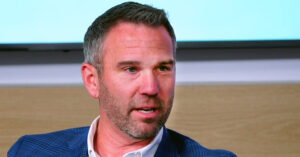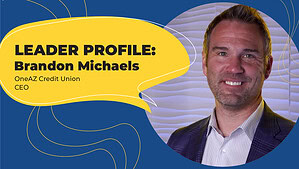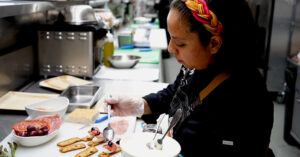We’re back with more insightful expertise and actionable advice in the eighth episode of our Community Collaborative Series. While progress is being made every day, our community leaders are here to remind us there is more work to be done when it comes to successfully implementing diversity and inclusion in our community and organizations. Given the current political climate, this episode takes a look into the importance of varying generations working together to create a powerful force for a more inclusive and equitable future.
Community Collaborative co-host/producer and Arizona Hispanic Chamber of Commerce CEO Monica Villalobos is joined by co-host/producer and Black Chamber of Arizona CEO Robin Reed to dive into today’s discussion. While the discussions on this show usually stem from the topics of race and ethnicity, this episode explores diversity and inclusion from a generational standpoint.
Joining today’s conversation are two dedicated and inspiring local leaders, Petra Falcon, Executive Director of Promise Arizona, and Ashley LaRae Sampson, entrepreneur and founder of Style PHX. Throughout the discussion, the leaders highlight the importance of voting as well as help to unpack how generational differences impact the approach to and implementation of diversity and inclusion.
While Villalobos, Reed, Falcon and Sampson work through ways to minimize generational gaps in order to come together for the benefit of diversity and inclusion, they explore imperative questions we should all consider:
- How can we learn from our past to better mobilize our approach to the future?
- How can we close the generational gaps within the workplace and instead work together to help each other on this path toward change?
Don't Miss These Highlights
Villalobos and Falcon begin the conversation by diving into the ways in which different generations can learn from and work with one another to create a powerful new force as we look to improve diversity and inclusion in the community and the workplace.
The conversation begins by looking toward the past. Falcon, known for her work and activism in the Latino community, reminds us of the important role history plays in our efforts to move forward with diversity and inclusion (9:22).
Citing historical movements from nearly five decades ago, Falcon notes that history is repeating itself. “We’re still fighting the very same issues,” she explains (10:08). She goes on to connect these issues to the divisiveness and concerns surrounding this year’s presidential election (10:33).
These issues and concerns have led to historic levels of voter turnout, especially among minority populations. Falcon notes, now more than ever, “people want to have their votes counted. People want to have a voice” (11:26).
When it comes to mobilizing the diverse vote, Villalobos and Falcon discuss the changes in the approach to this year’s election campaigning. To best relate to community members, whether for political or other reasons, we have to be willing to “meet people where they are,” Falcon explains (13:15).
Falcon goes on to highlight an imperative lesson from this year’s election and campaigning process: the need for leaders to relate to others, whether it be voters, employees, or remembers of the community. Falcon notes, “it’s about really having that trust and relationship” (13:38).
Falcon concludes by encouraging younger generations, who have often been deemed “apathetic” in political and communal efforts, to connect with family and community members to build a plan around getting involved in taking action, such as voting (15:26). Falcon calls on places of community, like churches and schools, to mediate community education and voice when it comes to local issues and initiatives (17:44).
Reed jumps in to segue into talking about passing the diversity and inclusion baton from one group of leaders to the next generation. In comparing the current approach to diversity and inclusion to a relay race, Reed discusses how “each generation is responsible for running their leg of the race,” bringing in Sampson as a voice of the millennial generation (22:08).
Sampson notes how different perspectives and desires are from generation to generation. Younger generations are learning from their observations of those before them, she points out, explaining the millennial distaste for the ‘go, go, go’ mentality (23:09).
Connecting back to the relay race metaphor, Sampson touches upon how younger generations, while desiring similar outcomes in terms of diversity and inclusion, don’t want to run the race the same way as those before them. “We need to be able to take it and run how we take it and run,” she says (24:33).
She continues by noting a smooth transition of leadership between generations can come about when there is a total understanding of these differences (24:49). She reminds us that when the race is won, regardless of how each generation chooses to run it, we’re all winners.
Sampson notes how each generation has witnessed different lifestyle norms, creating a gap in understanding one another. However, she highlights how adopting her generation’s appreciation of relaxation and mindfulness can help everyone by creating the space and time needed to align and move forward in the right direction (27:38). As Sampson points out, adjustments in approach to mental health will benefit past, present and future generations (29:27).
As she begins to wrap the conversation up, Villalobos reminds us that whether it be about race, gender or generational diversity and inclusion, we are running a marathon, not a sprint. “We have to play the long game,” she adds (30:12).
Actions We Can All Take
Whether it’s an election year or not, important takeaways from Episode 8 include:
- – Be sure to cast your ballot and utilize your voice. Don’t let others make those decisions for you (11:34)
- – Leaders must be willing to adjust to the environment to best meet people where they are (13:18)
- – Consider tapping into non-traditional ways to foster communication and build community, especially around important topics (14:30)
- – Don’t just show up. Make a plan to take action, especially when it comes to voting (15:32)
- – Communicate with your County Recorders for your Secretary of State to create pathways for change (17:08)
- – Leverage established institutions in the community to mediate education on important topics (17:44)
- – Consider the experiences and perspective of other generations to better understand and work with them (23:40)
- – Practice self-care by taking time to step back, relax and engage in conscious mindfulness (27:38)
- – “Take some time and relax. Cool off. Have a good time. Enjoy yourself. Enjoy your life. And stay safe” – Smokey Robinson (34:07)
- – Pay closer attention to how you treat others and how you treat yourself (38:35)
As communities and businesses move forward, Villalobos gives a final reminder that, when it comes to making strides toward a more inclusive future, “we have got to stick together” and “see ourselves as family” (36:15). It’s not enough to talk about diversity and inclusion. We must come together to make actionable efforts toward fostering a sense of belonging in our communities.
Regardless of what comes of this year’s presidential election, it is important for everyone, regardless of race, gender, or age, to collaboratively move this country forward. No matter who is elected, we must continue to advocate to get our ideas heard in a respectful and responsible way. As Reed reminds us, the people are the power in this country.
About The Community Collaborative
Community and business leaders and individuals who want to educate themselves on diversity issues will find the series informative and educational. And anyone who wishes to get involved will have ready access to resources featured in each program.
The video series may be streamed for free through the STN app. Viewers may subscribe through STN’s website or by downloading the STN app on the App Store or Google Play.
Each program in the series will provide details on how to get involved in featured activities and initiatives. To be featured in “The Community Collaborative” series or other STN programming, contact us at 480.967.7088.
Every day, there are leaders on the front lines of the fight to improve life in our community. STN provides the platform to tell their and their communities’ stories with video series on leadership philosophies and active efforts to make positive change in our region.





